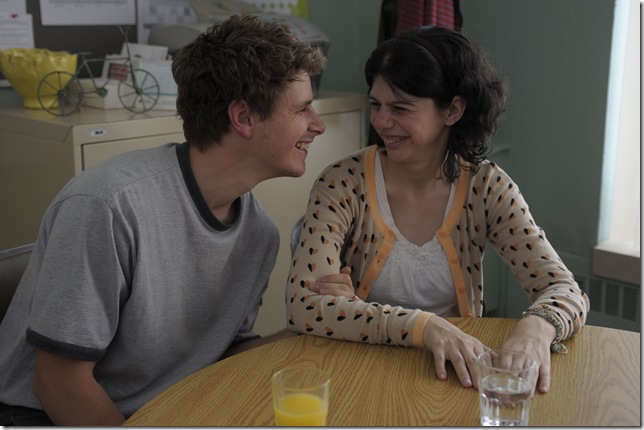I challenge you to find even one false note in director Louise Archambault’s Gabrielle, a sweet but unsentimental drama selected by Canada as its entry for Best Foreign Language Film at the recent Oscars. Authenticity is paramount, and the film feels like a documentary most of the time. It’s a fictionalized account of a real-life choir group of developmentally disabled singers, many of whom play versions of themselves.
Gabrielle (Gabrielle Marion-Rivard) is the central focus, a 22-year-old with Williams syndrome who comes of age, in a sense, over the course of the film’s 104 minutes. While preparing a concert in which their group, the Muses, will sing backup to the real-life Quebeçois pop star Robert Charlebois, Gabrielle falls in love with a choir mate, the golden-voiced Martin (Alexandre Landry). The movie becomes an artful, tender rendering of burgeoning love and lust, which some of the film’s authority figures attempt to prohibit, making the struggle between dependence and autonomy the overarching theme of Gabrielle.
When watching Gabrielle, it’s hard not to conjure 1987’s Gaby: A Love Story, another docu-dramatic account of a developmentally disabled young woman discovering her sexuality and suffering roadblocks because of it; the movie’s protagonists even happen to share the same name. But I liked this new Gabrielle just as much. The actors were obviously so comfortable with Archambault that, together, they make the cameras effectively disappear, creating an unguarded, seemingly unscripted atmosphere of community.
Frequently, where other directors might veer into melodrama, Archambault maintains a de-dramatized, even keel. There is little, if any, musical score to cue our emotions, aside from the Muses’ lovely choral compositions, and even when a character has a seizure, it’s filmed as matter-of-factly as everything else.
In some important ways, the director emphasizes Gabrielle’s Otherness, doing an exquisite job at getting inside her lead character’s head and making her world ours. In her defiant, dangerous trips alone in the big city — to find Martin, whose oppressive mother has withdrawn him from choir practice — we’re acutely conscious of every bit of car exhaust, every footfall, every breath; the everyday, outside world has rarely seemed as scary.
But mostly, Gabrielle’s conflicts are universal ones. She explodes with frustration as she struggles with simple tasks we take for granted — applying a tampon, making toast — but we don’t feel pity for her, just empathy and admiration for her desire to break free of her older sister Sophie’s (Melissa Desormeaux-Poulin) careful watch. But at the same time, Gabby clings to her sister, to the extent that Sophie’s own plans to relocate to India (where her boyfriend teaches music) are put on hiatus.
This push and pull between independence and codependence exists within most of us, whether or not we have special needs. It’s written into our DNA.
GABRIELLE. Director: Louise Archambault; Cast: Gabrielle Marion-Rivard, Alexandre Landry, Melissa Desormeaux-Poulin, Vincent-Guillaume Otis, Marie Gignac; Distributor: Entertainment One; Rating: R; in French with English subtitles; Opens: Friday at Coral Gables Art Cinema; April 25 at the Tower Theater in Miami
